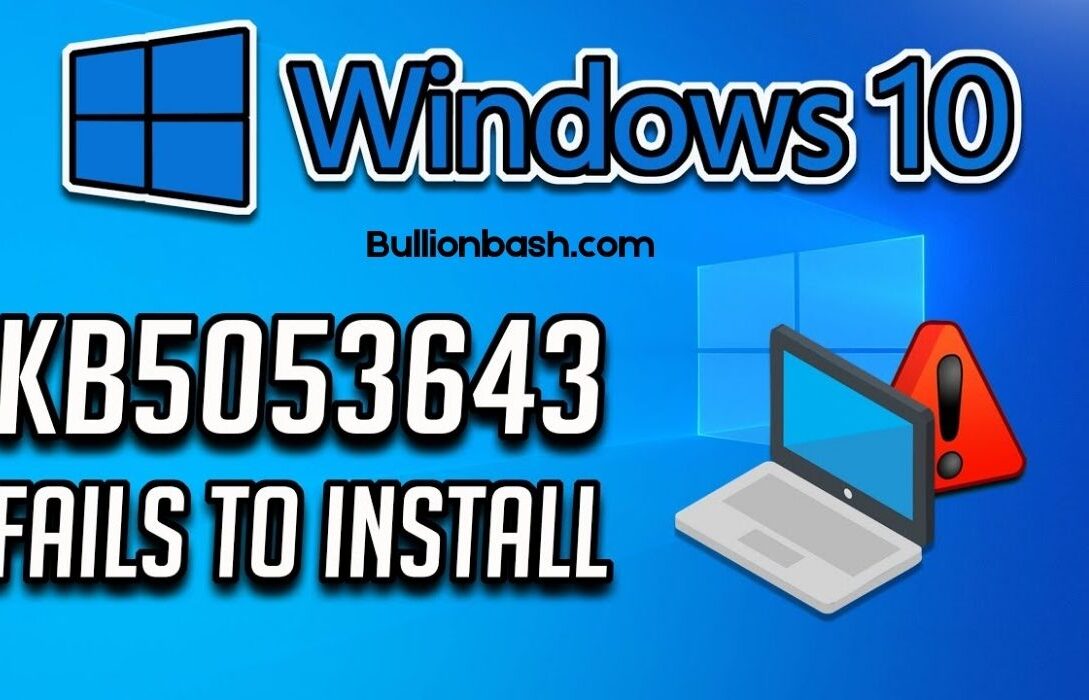Introduction
So here’s the quick version: KB5053643 is just one of those regular Windows 10 cumulative updates that rolled out recently. It pushes your PC to OS Build 19045.5679, fixes a bunch of nagging bugs, and smooths out performance. Nothing too flashy, no brand-new features, but important if you like your system running without hiccups.
What is KB5053643?
Release date and Windows version it applies to
This update dropped on March 25, 2025. It’s for folks still on Windows 10 version 22H2, which, honestly, is the last major branch of Windows 10 that’s still getting attention.
OS Build details (19045.5679 for Windows 10, version 22H2)
After you install it, your system moves to OS Build 19045.5679. That’s Microsoft’s internal “build number” — basically their way of saying, “Yep, you’re patched and up to date.”
Is it a security or preview (optional) update?
This one’s a preview update (non-security). Meaning it’s optional. If you don’t install it now, don’t worry — all the fixes will get rolled into the next Patch Tuesday anyway.
What’s New in KB5053643?
Key fixes and improvements included
This update focuses on bug fixes more than anything. It addresses issues with taskbar responsiveness, weird USB connection dropouts, and Remote Desktop reliability.
Performance and reliability changes
Behind the curtain, Microsoft tweaked how system processes work so there are fewer random crashes. Think of it as oiling the gears — you probably won’t “see” the changes, but you’ll feel the system acting smoother.
Features impacted (File Explorer, Remote Desktop, USB devices, etc.)
- File Explorer should freeze less often.
- Remote Desktop connections feel more stable.
- USB devices don’t randomly disconnect like before.
Link to official Microsoft changelog
If you’re the type who loves digging into the official notes, you can always check the Microsoft support page or the Update Catalog for the full list.
Should You Install KB5053643?
Benefits of installing this update
- More stable system performance
- Smoother app handling
- Better USB and hardware support
Known issues and risks reported by users
Some users noticed their taskbar freezing up after the update. Others had mouse/keyboard lag through USB. Not everyone runs into this, but yeah, it’s floating around in forums.
Who should wait before updating
If your PC is mission-critical (like you use it for work every day), maybe hold off a little. Let Microsoft iron out any new bugs before you jump in.
How to Download and Install KB5053643
Installing via Windows Update (recommended method)
- Hit Start → Settings
- Open Update & Security
- Tap Check for updates
- If it shows up, hit Download & install
Manual download from Microsoft Update Catalog
You can grab it straight from the Microsoft Update Catalog. Search the KB number, download the file that matches your system type (most folks use x64), and run it.
Offline installation with .MSU file
If you’re offline, you can snag the .MSU file on another PC and transfer it. Double-click it, follow the steps, and reboot.
Command-line install options (wusa, DISM) for IT admins
Admins love command lines. You can use:
wusa windows10.0-kb5053643-x64.msu /quiet /norestartOr handle bulk installs with DISM.
How to Uninstall or Roll Back KB5053643
Removing the update via Windows Settings
- Open Settings
- Go to Windows Update
- Tap Update history → Uninstall updates
Using Control Panel → Installed Updates
For old-school fans: Control Panel → Programs and Features → View installed updates → uninstall it.
Command-line uninstall with wusa /uninstall
For admins:
wusa /uninstall /kb:5053643Rollback advice if system becomes unstable
If your machine freaks out after installing, boot into Safe Mode and roll back using a restore point.
Troubleshooting KB5053643 Issues
Taskbar freezing or unresponsive
- Restart Windows Explorer in Task Manager
- Rebuild your icon cache
USB mouse and keyboard not working
- Swap to another USB port
- Update USB drivers
File Explorer performance issues
- Clear Quick Access history
- Run sfc /scannow
Remote Desktop connection problems
- Reset your RDP settings
- Double-check firewall rules
General fixes (Safe Mode, driver update, SFC/DISM scans)
When all else fails, run:
DISM /Online /Cleanup-Image /RestoreHealth → sfc /scannow
See Also: Benzino Net Worth: How Much Is He Really Worth in 2025?
KB5053643 for IT Admins and Enterprises
Deployment via WSUS/SCCM
IT admins can roll this out with WSUS or SCCM. Saves time if you’ve got loads of systems.
Update size and package details
- x64 package: roughly 600 MB
- ARM64: a bit smaller
Reboot requirements and downtime planning
Yes, you’ll need a restart. Plan maintenance windows, especially for servers or workstations in constant use.
Compatibility notes for enterprise environments
Generally plays nice, but tests in a lab setup first. Always safer that way.
How to Verify KB5053643 Installation
Checking Windows build number after install
Hit Win + R, type winver, and look for 19045.5679.
Confirming update history in Settings
In Update history, make sure it’s listed as successfully installed.
Verifying with PowerShell or Command Prompt
Use this command:
wmic qfe | find “5053643”
FAQs About KB5053643
Is KB5053643 mandatory or optional?
Optional. If you skip it, the fixes will show up later in the cumulative rollup.
How long does it take to install?
Usually 15–20 minutes. A bit longer if your drive is slow.
What to do if installation fails?
Run the Windows Update Troubleshooter, or just grab the installer manually.
Can KB5053643 cause data loss?
Not directly. But if your system crashes mid-install, unsaved stuff could vanish. Always better to back up first.
Will future cumulative updates include this fix?
Yep, Microsoft bundles all fixes in future rollouts.
Conclusion
All said and done, KB5053643 is just another Windows 10 update that makes the system behave better. It patches small annoyances, improves stability, and helps your machine keep ticking along. If you like staying ahead, install it now. If you’re cautious, wait a bit and let others be the guinea pigs. Either way, make sure you’ve got backups ready — updates are great, but peace of mind is better.


